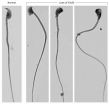(Press-News.org) HEIDELBERG, 13 May 2014 – More than 60 years ago Otto Warburg recognized that cancer cells differ from normal cells in the metabolic pathway they use for the oxidation of sugar. Rather than the typical series of oxidative steps that take place in the citric acid cycle, cancer cells metabolize sugar via the glycolytic pathway irrespective of whether oxygen is present or not. In The EMBO Journal, researchers in the United States report that the reason for this difference in colon cancer is changes in the Wnt signaling pathway, an essential communication pathway operating in these tumours.
"Cancer cells have different metabolic demands than normal cells," remarked Marian Waterman, Professor at the University of California, Irvine and the lead author of the study. "However, until now the molecular evidence for how this metabolic reprogramming takes place in cancers of the colon has not been very well defined. Our results show that Wnt signaling plays an important role in establishing aerobic glycolysis as the predominant sugar-metabolizing pathway to support colon cancer. We have also been able to identify one of the key molecular targets for the Wnt signal in cancer cells."
Wnt signaling has been implicated for some time in the development of many cancers, including colon cancer. However, these effects have been attributed to its action on the cell cycle. The researchers decided to investigate if Wnt had another role in cancer, specifically on metabolism, due to their observations of changes to the genes of metabolic enzymes in microarray experiments for colon cancer cells.
Biochemical assays and advanced imaging techniques in live cells revealed that blocking the activity of Wnt reduced glycolysis, promoted a shift to sugar metabolism by the citric acid cycle, and reduced tumour growth. The researchers also identified the enzyme pyruvate dehydrogenase kinase 1 as one of the targets for Wnt activity related to its effects on metabolism.
"In addition to reducing the size of tumours, blocking Wnt in the colon cancer cells reduced the number of blood vessels feeding the tumour. These effects could be reversed by restoring the activity of glycolysis-promoting pyruvate dehydrogenase kinase 1 in the cancer cells," said Waterman. "Our findings illustrate that glycolysis in the cancer cells promotes blood vessel development in the nearby environment for glucose delivery to the growing tumour."
The findings of the study have implications for the development of cancer therapies targeting the Wnt pathway. The choice of system or assay used to study the effects of Wnt inhibitors can make a big difference to drug testing. "Just because a Wnt inhibitor or potential drug candidate shows no effect on cell division in one molecular test does not mean that it might not have beneficial effects for cancer treatment due to its impact on metabolism in another test," said Waterman.
"Although more work is needed to define the complete effects of Wnt signaling on metabolism, it appears that this mechanism can be added to the growing list of signal transduction pathways that directly contribute to the regulation of cellular metabolism," said Craig Thompson, professor at the Memorial Sloan Kettering Cancer Center in the United States who is not an author of the paper.
INFORMATION:
Wnt signaling directs a metabolic program of glycolysis and angiogenesis in colon cancer
Kira T. Pate, Chiara Stringari, Stephanie Sprowl Tanio, Kehui Wang, Tara TeSlaa, Nate P. Hoverter, Miriam M. McQuade, Chad Garner, Michelle A. Digman, Michael A. Teitell, Robert A. Edwards, Enrico Gratton, Marian L. Waterman
The paper will be available at 12.00 noon Central European Time on Tuesday May 12 at emboj.embopress.org
A copy is also available upon request from barry.whyte@embo.org
Further information on The EMBO Journal is available at emboj.embopress.org
Media Contacts
Barry Whyte
Head | Public Relations and Communications
barry.whyte@embo.org
Thomas Schwarz-Romand
Senior Editor, The EMBO Journal
Tel: +49 6221 8891 407
schwarzr@embo.org
About EMBO
EMBO is an organization of more than 1500 leading researchers that promotes excellence in the life sciences. The major goals of the organization are to support talented researchers at all stages of their careers, stimulate the exchange of scientific information, and help build a European research environment where scientists can achieve their best work.
EMBO helps young scientists to advance their research, promote their international reputations and ensure their mobility. Courses, workshops, conferences and scientific journals disseminate the latest research and offer training in techniques to maintain high standards of excellence in research practice. EMBO helps to shape science and research policy by seeking input and feedback from our community and by following closely the trends in science in Europe.
For more information: http://www.embo.org
Researchers identify link between colon cancer and metabolism
2014-05-13
ELSE PRESS RELEASES FROM THIS DATE:
Dangerous nitrogen pollution could be halved
2014-05-13
Ambitious mitigation efforts, however, could decrease the pollution by 50 percent. The analysis is the very first to quantify this.
"Nitrogen is an irreplaceable nutrient and a true life-saver as it helps agriculture to feed a growing world population – but it is unfortunately also a dangerous pollutant," says Benjamin Bodirsky, lead-author of the study. In the different forms it can take through chemical reactions, it massively contributes to respirable dust, leads to the formation of aggressive ground-level ozone, and destabilizes water ecosystems. Damages in Europe ...
Male infertility: It's all about the package
2014-05-13
Cold Spring Harbor, NY – Infertility is generally thought of as a woman's problem. In fact, more than 3 million men across America also experience it. Today, researchers from Cold Spring Harbor Laboratory (CSHL) describe a key event during sperm development that is essential for male fertility. A team led by CSHL Professor Alea Mills explains how a protein controls DNA packaging to protect a man's genetic information.
The sperm is a simple delivery vehicle for a man's genetic information. The highly specialized cell is little more than a DNA bundle powered by molecular ...
Concerns raised over EU ban on ditching unwanted fish
2014-05-13
New rules banning fishermen from throwing away unwanted fish they have caught could harm wildlife – and fail to improve fish stocks, a University of Strathclyde report has found.
The study, published in the journal Nature Communications, suggests new reforms to the European Union's Common Fisheries Policy (CFP) – ending the practice of throwing away unwanted fish caught at sea – may have unintended consequences. The new CFP took effect on 1 January 2014 and will phase out the discarding of fish between 2015 and 2019.
The aim is to improve fish stocks – but Professor ...
Researchers identify genetic marker linked to OCD
2014-05-13
A group of researchers led by Johns Hopkins scientists say they have identified a genetic marker that may be associated with the development of obsessive-compulsive disorder (OCD), whose causes and mechanisms are among the least understood among mental illnesses.
The results of the research are published online May 13 by the journal Molecular Psychiatry.
"If this finding is confirmed, it could be useful," says study leader Gerald Nestadt, M.D., M.P.H., a professor of psychiatry and behavioral sciences at the Johns Hopkins University School of Medicine and director of ...
Humans and companion animals harbor the same types of MRSA infections
2014-05-13
A shared population of methicillin-resistant Staphylococcus aureus (MRSA) bacteria circulates both in humans and companion animals, according to a study published this week in mBio®, the online open-access journal of the American Society for Microbiology.
"Our study demonstrates that humans and companion animals readily exchange and share MRSA bacteria from the same population," says senior author Mark Holmes, senior lecturer in preventive veterinary medicine at the University of Cambridge in England. MRSA naturally lives on the skin and also causes difficult-to-treat ...
E-cigarettes and mental health
2014-05-13
Researchers at University of California, San Diego School of Medicine report that people living with depression, anxiety or other mental health conditions are twice as likely to have tried e-cigarettes and three times as likely to be current users of the controversial battery-powered nicotine-delivery devices, as people without mental health disorders.
They are also more susceptible to trying e-cigarettes in the future in the belief that doing so will help them quit, the scientists said. The FDA has not approved e-cigarettes as a smoking cessation aid.
The study will ...
Novel target found for chemotherapy-resistant leukemia cells
2014-05-13
Researchers at Children's Hospital Los Angeles have discovered that by targeting a particular receptor, chemotherapy-resistant cancer cells can be killed in an acute form of childhood leukemia, offering the potential for a future treatment for patients who would otherwise experience relapse of their disease.
Nora Heisterkamp, PhD, and colleagues at The Saban Research Institute of Children's Hospital Los Angeles have discovered that by targeting the B-cell activating receptor (BAFF-R), chemotherapy-resistant precursor B acute lymphoblastic leukemia cells (pre-B ALL) can ...
Older, sicker men with early-stage prostate cancer do not benefit from aggressive treatment
2014-05-13
Treating older men with early-stage prostate cancer who also have other serious underlying health problems with aggressive therapies such as surgery or radiation therapy does not help them live longer and, in fact, can be detrimental, according to a study by UCLA researchers.
The study followed the cases of more than 140,500 men aged 66 and older diagnosed with early-stage prostate cancer between 1991 and 2007 from the Surveillance, Epidemiology and End Results (SEER) Medicare database. Men who also suffered from multiple major medical conditions such as a history of ...
Study: Former prisoners, parolees turn to emergency departments for care
2014-05-12
AURORA, Colo. (May 12, 2014) – Being released from prison or jail is a difficult time for the millions of Americans returning to their communities from correctional facilities. Add to the list of challenges a high risk of winding up in the emergency department or the hospital. That's according to a new study from the University of Colorado School of Medicine.
The study, published in the Journal of General Internal Medicine, provides support for efforts to improve access to insurance and readily available health care for this vulnerable group.
"This study comes at a ...
Researchers find new molecule to treat asthma
2014-05-12
La Jolla, Calif., May 12, 2014 -- A new study carried out by researchers at Sanford-Burnham Medical Research Institute (Sanford-Burnham), the Max Planck Institute for Colloids and Interfaces (Germany), the Free University of Berlin (Germany), UC San Diego, and Shinshu University (Japan) has identified a novel molecule that prevents T-cells from orchestrating asthma brought on by allergens. The findings, published on May 12 in Proceedings of the National Academy of Sciences (PNAS), show promise for a new potent therapeutic agent to treat asthma, a chronic disease affecting ...


